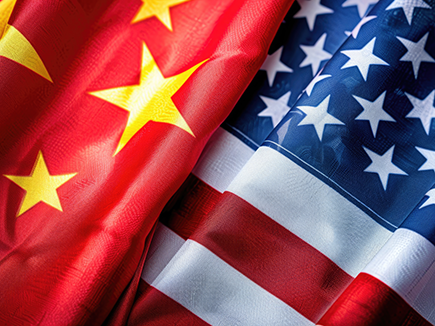Presidential decision-making and China
Aug. 14, 2024

Logically, the first national security question President Trump and Vice President Harris should be asked at any upcoming debate is this one: how will you deal with China? While that is unlikely to be a debate question (don’t get me started…), we can use each candidate’s past policies as a guide to 2024.
Trump’s policies toward China, like most of his foreign policy, are inconsistent. While in office, his focus was on China as an economic threat – a source of cheap labor and inexpensive imports that left American manufacturing workers jobless, and a rival in the race to produce cutting edge technology, such as electric cars, solar panels, or artificial intelligence (much of the technology allegedly stolen from the US). Massive tariffs on Chinese imports were the policy solution, generally a 10-25% tariff on nearly all Chinese imports to the US. Beijing retaliated with tariffs on US exports to China. The “trade war” did little to end the US trade deficit with China, and the impact on US manufacturing is still uncertain. Trump’s 2024 campaign platform includes a 10% across-the-board tariff on imports from every nation and a 60% tariff on Chinese imports.
In regards to Taiwan, Trump has been both defiant and compliant toward Beijing. Traditionally, U.S. policy has been one of “strategic ambiguity.” The US continues an alliance with Taiwan, while supporting a peaceful reunification of Taiwan and China; the US, however, sees any Chinese use of force against Taiwan as an act that might lead to US intervention. While increasing the level of arms sales to Taiwan, Trump has also backed down on his initial calls that hinted at a US recognition of an independent Taiwan (a Taiwan that rejects reunification with China, an event that Beijing warns would lead to a Chinese invasion). In a phone call with Chinese President Xi Jinping in February 2017, Trump moved back to the traditional “One China” policy after Xi made it clear he would refuse to meet with Trump unless Trump stated his support for “One China.” Xi likely saw this as successful intimidation. Recently, Trump has undermined US commitments to Taiwan by suggesting that Taiwan should pay the US if it wants the US to defend it and castigating Taiwan for stealing the US computer chip industry. This new line fits Trump’s overall concept of US foreign policy as bilateral and transactional; both China and Taiwan are treated outside any overall strategy, as separate entities negotiating deals with the US.
Harris’s views of China and Taiwan can only be inferred at this point. If we assume that Harris will continue Biden’s polices, Trump and Harris policies show some differences and some similarities. First, Biden/Harris policy is more traditional. Alliances have been at the core of the Biden/Harris response to China’s growing power. Rather than bilateral and transactional, Biden/Harris have focused on multilateral commitments: establishing AUKUS (an Australia, United Kingdom, US defense relationship); strengthening the Quadrilateral Security Dialogue (the Quad, consisting of the US, India, Japan, and Australia); holding historic trilateral summits between the US, Japan, and South Korea; firming up the US-Philippines defense relationship; nurturing a trilateral relationship between the US, Philippines, and Japan; and developing the Indo-Pacific Framework for Prosperity, a 13 nation economic agreement in Northeast and Southeast Asia representing 40% of world GDP, but noticeably not including China. Second, Biden has continued most of the Trump tariffs on China, and gone even further. In a significant and underreported reformulation of US trade policy Biden/Harris trade policy has called for using selective tariffs and government subsidies/investments in key industrial sectors to allow them to compete with Chinese industries. Third, Biden has on five occasions stated outright that the US would defend Taiwan, a strategic clarity that abandons the traditional ambiguity. Though the White House has characterized these statements as consistent with US policy, they are clear departures.
One wild card in a potential Harris/Walz administration would be Governor Tim Walz’s experience with China. If he becomes Vice President, he will have more knowledge of China than any Vice President since GHW Bush. Walz taught English in China in 1989 and as a high school teacher took students to China for summer programs throughout the 1990s. He would best be described as a friend of the Chinese people, but a critic of its government, particularly its human rights record. Walz was a member of the Congressional-Executive Commission on China, a bipartisan legislative committee that reported on Chinese human rights practices. He has met with both the Dalai Lama and Hong Kong democracy activist Joshua Wong, two meetings that will likely make Beijing suspicious of an incoming Harris/Walz team.
A comparison of Trump policies to Biden/Harris policies shows a similarity in trade policy. Both seek to compete with China. Tariffs are the stick to use against China, but Biden/Harris compliment it with domestic economic policies that hope to help US industries keep pace with Chinese industries. On Taiwan, Trump’s off-the-cuff statements undermine US commitments, while similar statements from Biden reinforce US commitments. Most importantly, the key difference may be the underlying foreign policy instincts. For Biden and perhaps Harris, China policy is one aspect of the overall preservation of the rules-based international order and the health of the US economy. Their policies fit with the traditional viewpoints of every US president from FDR through Reagan to Obama.
For Trump, US foreign policy is about bilateral transactions unconnected to any overall strategic design, more like
financial transactions for a businessman rather than the components of a grand strategy. His policies attract those voters who feel that upholding the rules-based international order no longer benefits the US. That is a fundamental choice, one the nation will make in November.